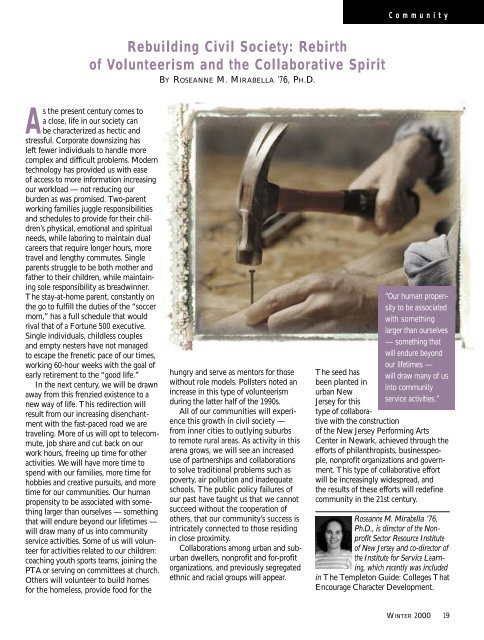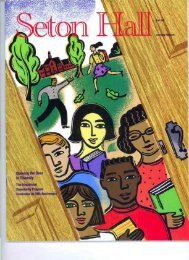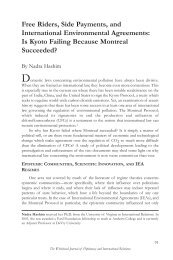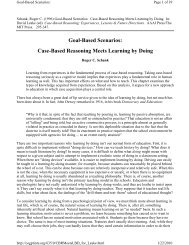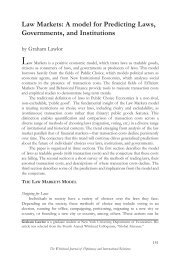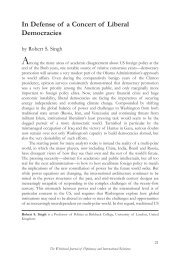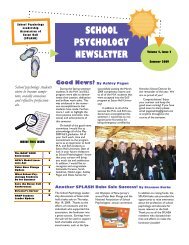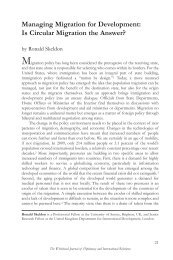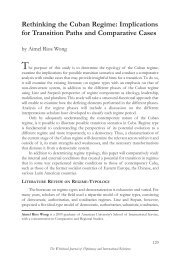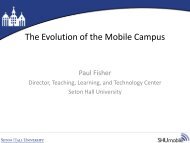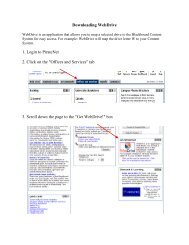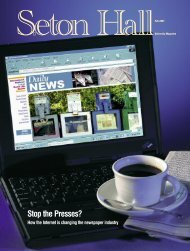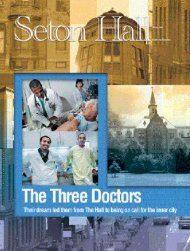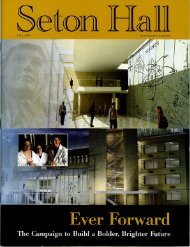Seton Hall Magazine, Winter 2000 - Seton Hall University
Seton Hall Magazine, Winter 2000 - Seton Hall University
Seton Hall Magazine, Winter 2000 - Seton Hall University
Create successful ePaper yourself
Turn your PDF publications into a flip-book with our unique Google optimized e-Paper software.
Rebuilding Civil Society: Rebirth<br />
of Volunteerism and the Collaborative Spirit<br />
BY ROSEANNE M. MIRABELLA ’76, PH.D.<br />
Asthe present century comes to<br />
a close, life in our society can<br />
be characterized as hectic and<br />
stressful. Corporate downsizing has<br />
left fewer individuals to handle more<br />
complex and difficult problems. Modern<br />
technology has provided us with ease<br />
of access to more information increasing<br />
our workload — not reducing our<br />
burden as was promised. Two-parent<br />
working families juggle responsibilities<br />
and schedules to provide for their children’s<br />
physical, emotional and spiritual<br />
needs, while laboring to maintain dual<br />
careers that require longer hours, more<br />
travel and lengthy commutes. Single<br />
parents struggle to be both mother and<br />
father to their children, while maintaining<br />
sole responsibility as breadwinner.<br />
The stay-at-home parent, constantly on<br />
the go to fulfill the duties of the “soccer<br />
mom,” has a full schedule that would<br />
rival that of a Fortune 500 executive.<br />
Single individuals, childless couples<br />
and empty nesters have not managed<br />
to escape the frenetic pace of our times,<br />
working 60-hour weeks with the goal of<br />
early retirement to the “good life.”<br />
In the next century, we will be drawn<br />
away from this frenzied existence to a<br />
new way of life. This redirection will<br />
result from our increasing disenchantment<br />
with the fast-paced road we are<br />
traveling. More of us will opt to telecommute,<br />
job share and cut back on our<br />
work hours, freeing up time for other<br />
activities. We will have more time to<br />
spend with our families, more time for<br />
hobbies and creative pursuits, and more<br />
time for our communities. Our human<br />
propensity to be associated with something<br />
larger than ourselves — something<br />
that will endure beyond our lifetimes —<br />
will draw many of us into community<br />
service activities. Some of us will volunteer<br />
for activities related to our children:<br />
coaching youth sports teams, joining the<br />
PTA or serving on committees at church.<br />
Others will volunteer to build homes<br />
for the homeless, provide food for the<br />
hungry and serve as mentors for those<br />
without role models. Pollsters noted an<br />
increase in this type of volunteerism<br />
during the latter half of the 1990s.<br />
All of our communities will experience<br />
this growth in civil society —<br />
from inner cities to outlying suburbs<br />
to remote rural areas. As activity in this<br />
arena grows, we will see an increased<br />
use of partnerships and collaborations<br />
to solve traditional problems such as<br />
poverty, air pollution and inadequate<br />
schools. The public policy failures of<br />
our past have taught us that we cannot<br />
succeed without the cooperation of<br />
others, that our community’s success is<br />
intricately connected to those residing<br />
in close proximity.<br />
Collaborations among urban and suburban<br />
dwellers, nonprofit and for-profit<br />
organizations, and previously segregated<br />
ethnic and racial groups will appear.<br />
C o m m u n i t y<br />
“Our human propensity<br />
to be associated<br />
with something<br />
larger than ourselves<br />
— something that<br />
will endure beyond<br />
our lifetimes —<br />
will draw many of us<br />
into community<br />
service activities.”<br />
The seed has<br />
been planted in<br />
urban New<br />
Jersey for this<br />
type of collaborative<br />
with the construction<br />
of the New Jersey Performing Arts<br />
Center in Newark, achieved through the<br />
efforts of philanthropists, businesspeople,<br />
nonprofit organizations and government.<br />
This type of collaborative effort<br />
will be increasingly widespread, and<br />
the results of these efforts will redefine<br />
community in the 21st century.<br />
Roseanne M. Mirabella ’76,<br />
Ph.D., is director of the Nonprofit<br />
Sector Resource Institute<br />
of New Jersey and co-director of<br />
the Institute for Service Learning,<br />
which recently was included<br />
in The Templeton Guide: Colleges That<br />
Encourage Character Development.<br />
WINTER <strong>2000</strong> 19


